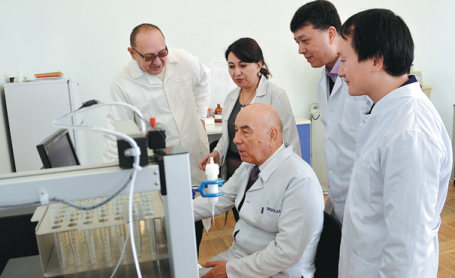BRI prompts closer global scientific cooperation


Basic needs
As he surveyed the Kenyan grassland, zoologist Jiang Xuelong was bitten by ticks at least 24 times. Some even burrowed under his skin and had to be removed with a knife.
Yan Xue, executive director of the joint research center in Kenya, said poor transportation, cultural barriers and dangerous wildlife are common challenges for scientists working in the field.
However, that did not stop Chinese and African scientists from surveying water sources in East African countries such as Ethiopia, Kenya and Tanzania. They have completed investigations on the quality of drinking water in Tanzania's major cities, and are now working on cities in Kenya, Yan said.
By 2024, Chinese and African scientists hope to build a database on East Africa's major rivers and lakes to help local officials make decisions on water safety, irrigation, hydroelectric power, environmental protection and other water-management issues, based on countries' specific needs, Yan added.
According to the nonprofit Water Project, water security is one of the biggest environmental challenges for African development. About 319 million people in Africa south of the Sahara have poor access to potable water.
Yan said: "The continent is not as dry as people think; there are lakes, rivers and oases throughout East Africa. The problem is lack of infrastructure, expertise and data to effectively use those resources."
Kenya and Tanzania are famed for eco-tourism, including the Great Migration, which sees millions of animals move during the dry season in search of sources of water and new habitats.
"If we can help officials better understand, track and protect those water sources, it would make industry more sustainable," Yan said.
Hu Chunsheng, director of the Center for Agricultural Resources Research at CAS, said effective water use would also lead to improved food production, a key factor in sustaining African societies amid population booms.
Agriculture is the backbone of many African economies. However, productivity has been stagnating due to a lack of advanced equipment, crop varieties and farming methods, he said.
In response, since 2014, Hu and his colleagues have brought several dozen high-quality crops from China and planted them at a cultivation demonstration area at the Sino-Africa Joint Research Center. They include Chinese-developed hybrid rice, maize, grains, sorghum and high-value commercial fruits such as grapes.
In 2017, the hybrid rice demonstrated great advantages in both growth and yields, compared with local varieties. WS13, the most successful variety, yields about 11.4 metric tons per hectare, compared with 4.87 tons per hectare for Kenya's native Basmati rice.
Chinese scientists have also selected sweet sorghum varieties from Africa and created quality hybrids with improved resistance to disease and drought, in addition to prompting higher yields, Hu said.
"All these crops have been carefully selected to succeed in the local environment and climate, and to satisfy people's dietary and economic needs," he added.
"By sharing agricultural knowhow, we hope to help African countries foster the talent and ability needed to modernize their agricultural sectors," Hu said. "In turn, this will improve the livelihoods of African farmers and open new areas for Sino-African agricultural cooperation."
However, the crops are still being tested and have not yet reached the market.


